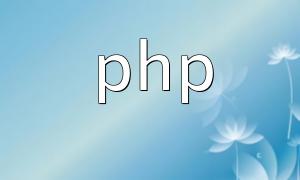PHP is a widely used server-side scripting language in web development. There are two ways to pass parameters in PHP: pass-by-value and pass-by-reference. This article will focus on the pass-by-value mechanism in PHP and help readers understand this concept through practical code examples.
Pass-by-value means that a copy of the parameter is passed to the function, meaning modifications within the function will not affect the original variable. Pass-by-value is commonly used for primitive data types such as integers, floating-point numbers, and strings. Below is a simple example:
<?php
function addNumber($num) {
$num = $num + 10;
return $num;
}
$number = 5;
$newNumber = addNumber($number);
echo "Original value: " . $number . "<br>"; // Output 5
echo "Modified value: " . $newNumber; // Output 15
?>In the above example, the function addNumber takes a parameter $num and returns the value of $num plus 10. However, the value of the external variable $number remains unaffected by the function's internal changes.
Even though PHP generally uses reference passing for arrays and objects, the actual behavior follows the pass-by-value mechanism, which might differ from what we expect. Below is an example of pass-by-value with objects:
<?php
class Person {
public $name;
}
function changeName($obj) {
$obj->name = 'Lucy';
}
$person = new Person();
$person->name = 'John';
changeName($person);
echo "Original name: " . $person->name . "<br>"; // Output John
echo "Modified name: " . $person->name; // Output Lucy
?>In this example, even though the object $person is passed to the function changeName by reference, the function only modifies the object's property, and the changes are limited to the function scope.
Similarly, the same behavior applies to arrays. Below is an example of pass-by-value with arrays:
<?php
function changeElement($arr) {
$arr[0] = 100;
}
$array = [1, 2, 3];
changeElement($array);
echo "Original array:";
print_r($array); // Output [1, 2, 3]
?>As shown above, even though the array elements are modified, the original array remains unchanged outside the function.
Through this article, we have gained an in-depth understanding of PHP's pass-by-value mechanism. For primitive data types, PHP passes a copy of the value, while for composite data types (such as arrays and objects), the reference behavior appears but still follows the pass-by-value principle in actual execution. Developers should choose the appropriate parameter passing method based on specific requirements to ensure the correctness of their programs.









